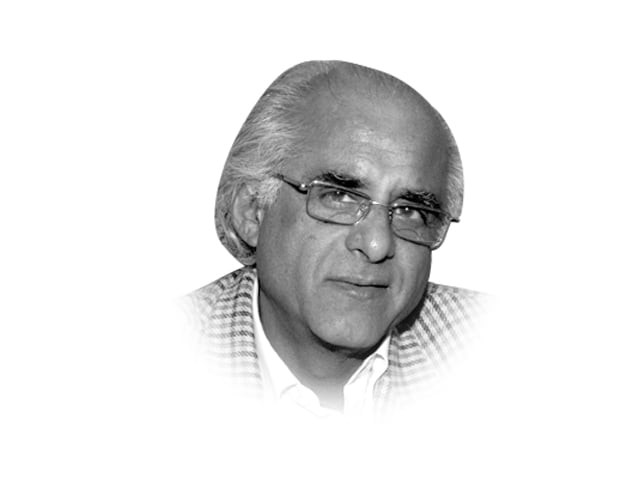Blinded by guilt
Those who kill in Pakistan are once again charged with religious fervour. They, too, have no remorse.

Blinded by guilt
Even before he entered the courtyard where we sat, we could hear the tap-tap-tap of his cane in the paved alley outside. Small of stature and a little hunched over by age, the man had large milky eyes that had not seen the light of day for 20 years. He himself was, so he said, 83 that year.
As a 20-year-old constable in the district administration, he was assigned as guard to a Sikh revenue officer in Kasur. When the line was drawn with Kasur falling to Pakistan and mayhem began, Charan and his officer crossed the BRB canal and made for the new India. On the crossing, they saw the brown waters clogged with bloated bodies, the Hindu and Sikh men, women and children who had only a few days earlier lived peaceably with the Muslim neighbours.
The emotion young Charan felt was not grief but hatred. There was also the intense desire for revenge. Across the border, the man made straight for his native village of Buttar and joined the mobs running rampage across the land. They killed and looted, killed and looted; their hearts bursting with religious fervour and indignation at the needless deaths of all their co-religionists, who had died in Pakistan. Yet, they remained unmindful of the needless deaths they were responsible for.
There was no remorse, no twinge of guilt upon doing in a fellow human being. It was as if men had descended to a level below the lowliest beasts. As more and more trainloads of dead Sikhs and Hindus arrived, the call to exact greater vengeance charged up Charan Singh.
Charan Singh said it was religious fervour that made him become part of the rampaging mob. It was passion whipped up by religious leaders in the name of God that made him kill the very same people who had lived amicably in the village. He said his blood had turned white and he lost count of the number of people he killed. Many of these were neighbours to whom his family sent food on the Lori festival, and who in turn, sent them vermicelli or meat depending on which Eid it was.
One day, so he related, the mob killed so many that they had to load the corpses in three ox carts to dump in the Beas. The grisly convoy was followed by the women who had survived the killing of their men folk. As they were about to tip the carts over by the river, the women started to jump into the water as well. Charan said he and the others tried to stop them, offering them new lives as Sikhs. But it was to no avail. “They were made of very strange mettle. Not one of them survived. They went into the eddies without a sound, without a curse hurled at us, we who had wronged them so terribly,” he said, his unseeing eyes staring at me.
That cold morning, Charan Singh said he had lost his eyes because he had sinned against his own brothers. “I killed without remorse and was punished by the Parmatama.” He spoke sadly but, he added, in the heat of the madness, he had felt no regret. Remorse set in only after many years had gone by.
Very like Charan Singh’s case was that of Jala Teli and his accomplices who had killed in Laliani near Kasur. They, too, had gone blind in their later lives and died riven by remorse. But the question is whether these men would have felt this same remorse had they not lost the use of their eyes? Was this guilt only because they were helpless and felt somehow that they were punished for their sins by whatever deity they believed in?
These are questions that I cannot answer. But the sad thing is that we in Pakistan live through another age of partition. Those who kill are once again charged with religious fervour. They, too, have no remorse.
Published in The Express Tribune, October 13th, 2012.















COMMENTS
Comments are moderated and generally will be posted if they are on-topic and not abusive.
For more information, please see our Comments FAQ